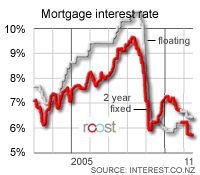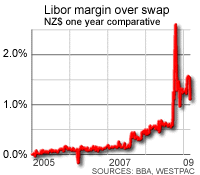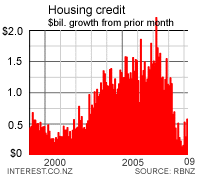 The US Government has announced it will take control of US mortgage behemoths Fannie Mae and Freddie Mac to prevent their collapse completely cripping the US housing market, and therefore damaging the world's largest economy.
The scale of this move is enormous and will have global ramifications.
Fannie and Freddie are the guarantors of almost half of the US$12 trillion of US mortgages in existence right now. The progressive collapse of confidence in the US sub-prime mortgage market since mid 2007 has seen funding for everyone else but Fannie and Freddie dry up. The US government guarantees they have for their debt (recently made explicit) have meant the two federally mandated but privately owned firms have been writing more than 70% of US mortgages.
Their collapses would have been a catastrophe for the US housing market and for the US financial system. That's because many US investors and US banks own bonds guaranteed by Fannie and Freddie. Many overseas central banks and commercial also hold trillions of dollars of these bonds. The system would have ground to a halt.
As it is, many of these same investors and banks will feel the pain of seeing the value wiped out of any shares they hold and potentially any preferred shares they hold.
The US Government has announced it will take control of US mortgage behemoths Fannie Mae and Freddie Mac to prevent their collapse completely cripping the US housing market, and therefore damaging the world's largest economy.
The scale of this move is enormous and will have global ramifications.
Fannie and Freddie are the guarantors of almost half of the US$12 trillion of US mortgages in existence right now. The progressive collapse of confidence in the US sub-prime mortgage market since mid 2007 has seen funding for everyone else but Fannie and Freddie dry up. The US government guarantees they have for their debt (recently made explicit) have meant the two federally mandated but privately owned firms have been writing more than 70% of US mortgages.
Their collapses would have been a catastrophe for the US housing market and for the US financial system. That's because many US investors and US banks own bonds guaranteed by Fannie and Freddie. Many overseas central banks and commercial also hold trillions of dollars of these bonds. The system would have ground to a halt.
As it is, many of these same investors and banks will feel the pain of seeing the value wiped out of any shares they hold and potentially any preferred shares they hold.
 The US Treasury will immediately take a 79.9% stake in Freddie and Fannie and potentially pump US$200 billion of capital into their balance sheets. The US government has also extended a secured credit facility to 12 other Federal Home Loan Banks.
So what does this mean for us?
The sheer scale of the rescue and the sense of shock that the US government was forced to bail out the mortgage market will reverberate around finanicial markets. Already the New Zealand dollar has jumped to 68 US cents by mid Monday morning from as low as 66.2 US cents on Friday night.
The giant mortgage bailout damages the prestige of the US dollar and implies a massive amount of fresh US government credit will be pumped into the US financial system. That, in theory, would prove inflationary and therefore reduce the value of the US dollar.
But there could be other ramifications, particularly for global interest rates. This could either calm things down and reassure investors that the worst is over. Or it could shock foreign investors into realising we are in the middle of a once in a lifetime deleveraging event that will spread throughout the global financial system.
That will make foreign investors even more wary of lending to "riskier" economies (than their own) such as New Zealand and Australia. New Zealand banks owed foreign lenders NZ$135 billion at the end of March, including NZ$61 billion that has to be refinanced every 90 days.
More market volatility is likely to increase the interest rates those foreign investors will charge us to keep borrowing that money. The chart above, which measures the difference between interbank lending rates and pure wholesale rates, is a proxy for the increase in funding costs for New Zealand banks. Our banks have had to absorb a 70-80 basis point increase in funding costs in the last year. Some of it has been passed on, but the rest hasn't, reducing their profit margins.
The US Treasury will immediately take a 79.9% stake in Freddie and Fannie and potentially pump US$200 billion of capital into their balance sheets. The US government has also extended a secured credit facility to 12 other Federal Home Loan Banks.
So what does this mean for us?
The sheer scale of the rescue and the sense of shock that the US government was forced to bail out the mortgage market will reverberate around finanicial markets. Already the New Zealand dollar has jumped to 68 US cents by mid Monday morning from as low as 66.2 US cents on Friday night.
The giant mortgage bailout damages the prestige of the US dollar and implies a massive amount of fresh US government credit will be pumped into the US financial system. That, in theory, would prove inflationary and therefore reduce the value of the US dollar.
But there could be other ramifications, particularly for global interest rates. This could either calm things down and reassure investors that the worst is over. Or it could shock foreign investors into realising we are in the middle of a once in a lifetime deleveraging event that will spread throughout the global financial system.
That will make foreign investors even more wary of lending to "riskier" economies (than their own) such as New Zealand and Australia. New Zealand banks owed foreign lenders NZ$135 billion at the end of March, including NZ$61 billion that has to be refinanced every 90 days.
More market volatility is likely to increase the interest rates those foreign investors will charge us to keep borrowing that money. The chart above, which measures the difference between interbank lending rates and pure wholesale rates, is a proxy for the increase in funding costs for New Zealand banks. Our banks have had to absorb a 70-80 basis point increase in funding costs in the last year. Some of it has been passed on, but the rest hasn't, reducing their profit margins.

Opinion: What the US mortgage bailout might mean for us
Opinion: What the US mortgage bailout might mean for us
8th Sep 08, 10:26am
by

We welcome your comments below. If you are not already registered, please register to comment
Remember we welcome robust, respectful and insightful debate. We don't welcome abusive or defamatory comments and will de-register those repeatedly making such comments. Our current comment policy is here.